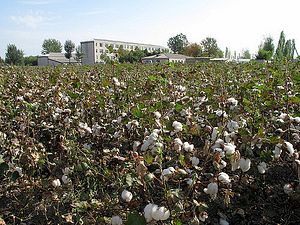If there’s one topic the government of Uzbekistan wished would fade away, it’s probably the issue of forced labor in the cotton industry. But just like the cotton harvest, the issue crops up every year.
In a new report — titled “We Can’t Refuse to Pick Cotton” — Human Rights Watch and the Uzbek-German Forum for Human Rights claim that forced labor practices continue in project areas funded by the World Bank, despite loan agreements that include provisions requiring the Uzbek government to comply with international laws prohibiting child and forced labor. Notably, the loan agreements provide for suspension “if there is credible evidence of violations,” but the World Bank has not halted projects despite numerous reports and indications that violations continue.
In 2013, three Uzbek human rights organizations appealed to the World Bank’s Inspection Panel — an ostensibly independent accountability mechanism that is supposed to ensure the Bank’s compliance with its own policies. But the panel declined to investigate; instead the World Bank put in place third-party monitoring of its projects in Uzbekistan.
As I wrote in 2015 (and as HRW notes in this and previous reports), the third-party monitoring system is far from ideal. The International Labor Organization (ILO), which orchestrates the monitoring with government and non-government groups in Uzbekistan, said in its report that year that the “organized recruitment of adults to pick cotton is widespread” and noted that individuals were circumspect when interviewed; “getting beyond what monitors were supposed to hear was sometimes difficult,” the ILO report said.
Nevertheless, the ILO concluded that it did not find “conclusive information that beneficiaries of World Bank projects used child or forced labor during the cotton harvest.”
So the loans continued and expanded.
In 2015 and 2016, the World Bank provided more than $500 million in loans to the Uzbek government for agricultural projects, in particular irrigation projects. In one such project in Karakalpakstan, HRW says observers from the Uzbek-German Forum for Human Rights found evidence of continued forced labor.
None of this is breaking news; yet the World Bank seems to downplay the issue in favor of access.
Jessica Evans, a senior researcher at Human Rights Watch and author of the report, told The Diplomat that the World Bank has prioritized dialogue with the Uzbek government over punitive measures. “The World Bank,” she said, “has emphasized to us that it believes it will achieve more by staying invested in the sector.”
But, Evans said, HRW believes “the Uzbek government should be judged based on what is happening on the ground.” And what is happening on the ground is what has happened for years: people forced into the fields — doctors, teachers, students. Monitors working with the Uzbek-German Forum for Human Rights “spoke briefly to approximately 400 people” involved in the cotton industry in 2015 and about 200 in 2016; the group also conducted in-depth interviews with 250 people between 2015 and 2016.
One colleague teacher said in 2017, “Of course I wouldn’t go if I had the choice. None of my colleagues would either. It’s forced, everyone is forced…”
Meanwhile, Tashkent is praised by the World Bank (and others) for “taking actions, albeit in a very incremental and cautious manner, that reflect a genuine commitment to abide by its national laws and international commitments.”
With a new president in place, there’s an opportunity for a change in state policies. But, as Evans noted, when Shavkat Mirziyoyev was prime minister he “had oversight over the cotton system and supervised the forced labor system.” At present, she said, “the government continues to force its citizens to weed cotton fields under threat of penalty.”
“Human Rights Watch is hopeful that the new Uzbek government will provide change, but our key measure will be what takes place in the cotton fields,” Evans said.
































